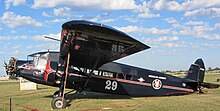| SM-6000 Airliner | |
|---|---|

| |
| Stinson SM-6000B Airliner trimotor circa 1965 when owned by RP Rice of Kennett, MO. | |
| Role | Three-engined airlinerType of aircraft |
| National origin | United States |
| Manufacturer | Stinson Aircraft Corporation |
| Number built | 53 (SM-6000) 24 (Model U) |
The Stinson SM-6000 Airliner was a 1930s three-engined (trimotor) ten-passenger airliner designed and built by the Stinson Aircraft Corporation. The SM-6000 was a high-wing braced monoplane with room for a pilot and a cabin for ten passengers. It was powered by three 215 hp (160 kW) Lycoming R-680 engines strut-mounted one each side above the main landing gear units and one in the nose. A number of variants were built mainly with improved interiors. In 1932 the Model U Airliner was produced which had low-set stub wings with additional two engines mounted on each wing complementing the existing nose mounted center engine.
Variants
- Corman 6000
- The initial prototypes produced by the Corman aircraft Co. as part of the E L Cord empire.
- SM-6000 Airliner
- 1930 initial production variant with three 215hp (160kW) Lycoming R-680 engines.
- SM-6000-A Airliner
- 1930 variant available with different interior configurations.

- SM-6000-B1 Airliner
- 1931 all-passenger variant with better interior equipment.
- SM-6000-B2 Airliner
- As the B1 but with a mixed mail/passenger interior.
- Model U Airliner
- 1932 improved model with three 240hp (179kW) Lycoming R-680-BA engines on stub wings.
- C-91
- United States military designation for one SM-6000-A (s/n 42-79547) impressed into service in 1942.
Survivors
Only two of these high-wing models are known to exist. One is owned and operated by Mid America Flight Museum in Mount Pleasant, TX, the other by Kermit Weeks and is maintained in airworthy condition at Fantasy of Flight in Polk City, Florida.
Operators
- American Airways
- Boston-Maine Central Vermont Airways
- Century Airlines
- Chesapeake Airways
- Chicago and Southern Airlines
- Delta Air Lines
- National Airlines System
- New York, Philadelphia and Washington Airway Corporation aka Ludington Airline
- Rapid Air Lines
Specifications (SM-6000-B)
Data from
General characteristics
- Crew: two
- Capacity: ten (B1), eight (B2)
- Length: 42 ft 0 in (12.8 m)
- Wingspan: 60 ft 0 in (18.29 m)
- Height: 12 ft 0 in (3.66 m)
- Wing area: 490 sq ft (45.6 m)
- Empty weight: 5,670 lb (2,620 kg)
- Gross weight: 8,600 lb (3,910 kg)
- Powerplant: 3 × Lycoming R-680 , 215 hp (160 kW) each
Performance
- Maximum speed: 146 mph (234 km/h, 127 kn)
- Cruise speed: 125 mph (200 km/h, 109 kn)
- Range: 390 mi (628 km, 340 nmi)
- Service ceiling: 14,200 ft (4,330 m)
- Rate of climb: 1,000 ft/min (5.1 m/s)
Notes
- Wegg 1990, p.118.
- Donald M. Pattillo. A History in the Making: 80 Turbulent Years in the American General Aviation Industry. p. 10.
- As pictured on timetable, March 21, 1934, Boston Maine Airways Central Vermont Airways, and other schedules; pictured in Boston and Maine Airways employee magazine, "Boston-Maine Airways, Inc., Take Air Again in Year-Round Service;" circa 1933; discussed at length by Robert W. Mudge in Adventures of a Yellowbird: the biography of an airline, Branden Press, 1969.
- ^ Gradidge 1989, p. 18
- "Stinson Trimotors - Holcomb's Aerodrome".
- Wegg 1990, p.128.
References
- Gradidge, J. M. G. (November 1989). "American Classics: Stinson SM-6000". FlyPast. No. 100. p. 18. ISSN 0262-6950.
- Taylor, Michael J. H. (1989). Jane's Encyclopedia of Aviation. London: Studio Editions.
- Wegg, John (1990). General Dynamics Aircraft and their Predecessors. London: Putnam Aeronautical Books. ISBN 0-85177-833-X.
- The Illustrated Encyclopedia of Aircraft (Part Work 1982-1985). Orbis Publishing.
External links
![]() Media related to Stinson SM-6000 at Wikimedia Commons
Media related to Stinson SM-6000 at Wikimedia Commons
| Stinson aircraft | |||||||||||||||||||
|---|---|---|---|---|---|---|---|---|---|---|---|---|---|---|---|---|---|---|---|
| Model numbers |
| ||||||||||||||||||
| Names | |||||||||||||||||||
| Military designations |
| ||||||||||||||||||